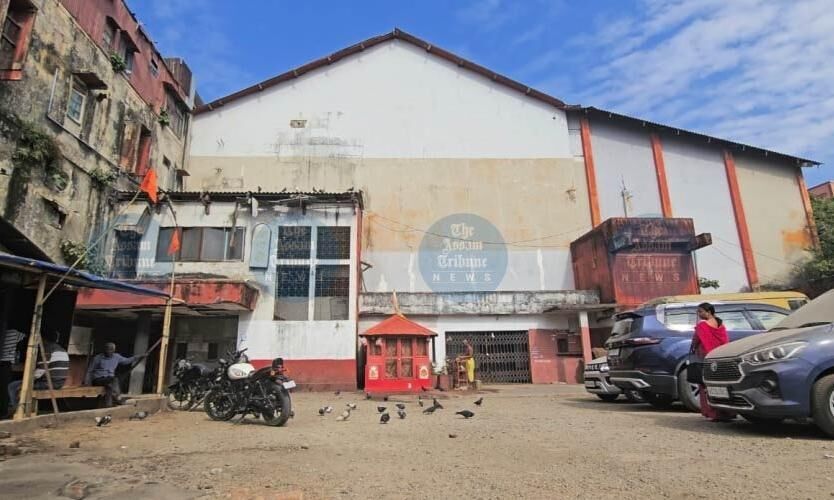
Tezpur, Jan 24: Jonaki Cinema Hall', the first movie theatre in Assam and a symbol of pride for the region and its residents, has been in a deplorable condition for many decades and is deteriorating day by day due to the government's totally indifferent attitude towards the first-ever cultural platform of the region.
While observing the death anniversary of cultural doyen Jyoti Prasad Agarwala in Tezpur recently, conscious citizens expressed their grave concern over the government's lackadaisical attitude towards this iconic cinema hall.
Established in 1937, Jonaki Cinema Hall is not just the oldest movie theatre in the region but is also a testament to the visionary spirit of Rupkonwar Jyoti Prasad Agarwala, the luminous pioneer in the realm of Assamese cinema and culture.
After completing the first Assamese film, Joymoti, in 1935, Jyoti Prasad had realised that there was no permanent cinema hall in Assam for regular screening of films. Therefore, he embarked on an audacious journey to build Assam's first exclusive cinema hall in his hometown, Tezpur.
Despite scepticism from a section of people, Jyoti Prasad's pioneering zeal pushed forward the construction of Jonaki Cinema Hall, which was constructed using iron trusses, bricks, lime paste, and wooden balconies, signifying a blend of local materials and skill. As a consequence of limited resources and skilled manpower, the original dimensions of the cinema hall were modest, but the sheer effort that went into its creation was innovative.
Located behind the Agarwala family home, the hall was named 'Jonaki' as a metaphor for bringing light and entertainment to people. 'Jonaki' was inaugurated formally with the screening of a British film titled Elephant Boy that starred Sabu Dastagir, an Indian boy, in the year 1937.
The movie turned out to be a crowd puller, marking Jonaki Cinema Hall as a beacon of cinematic culture in the region.However, its history reveals that though Jonaki Cinema Hall had an initial run of success, its fortunes began to dwindle due to the limited audience of a small town like Tezpur and faced the challenges of sustaining a regular film exhibition business.
Meanwhile, as Jyoti Prasad started focusing on other cultural and political activities, Jonaki Cinema Hall was handed over on lease to Abdul Hussain, a local businessman, but the business continued to decline.
Ultimately, the government cancelled Jonaki Cinema Hall's license due to structural weakness. However, Jyoti Prasad's youngest brother, Hridayananda Agarwala, reopened Jonaki Cinema Hall in 1941 after a series of renovations and repairs, with a screening of Blockhead, a Laurel and Hardy classic."Hridayananda's dedication kept Jonaki afloat, even during World War II, when Tezpur became a hub for Allied soldiers who frequented the cinema hall," said a local senior citizen, adding that Jonaki remained an important cultural landmark over the decades, witnessing the highs and lows of Assamese cinema and the entertainment industry in general.
By the 1960s, Assam's cinema scene was thriving, and Jonaki expanded its seating capacity to 1,000 persons. However, as television and home videos became more accessible in the 1980s and 1990s, single-screen theatres like Jonaki faced tough competition.Despite these challenges, the Agarwala family continued to persevere.
In 2009, Jonaki embraced the digital era, screening the Oscar-winning film Slumdog Millionaire as its first digital presentation. This step revitalised the cinema hall, drawing in new audiences and regenerating its past glory.
However, Jonaki's story is not just about a cinema hall; rather, it is about the resilience and passion of the Agarwala family, which fought to keep Jyoti Prasad Agarwala's vision alive by means of this cultural institution that serves as a reminder of the early struggles and triumphs of Assamese cinema.
It is important to note that when the culture of multiplexes started dominating the modern landscape, Jonaki's enduring legacy remained a testament to the pioneering spirit that gave birth to Assam's cinematic journey.
It is most unfortunate that this symbol of pride for the Assamese people started languishing in a most dilapidated condition a decade ago with just a handful of cinegoers and barely any decent financial returns.
Gradually, the local people ceased to visit the dilapidated cinema hall as, with the emergence of multiplexes and high-end movie halls all over, audiences became eager to pay some extra money to enjoy the experience of watching movies in a hall with better ambience and infrastructure.
In the meantime, the Assam State Film Finance and Development Corporation Limited came forward to revive Jonaki with a renovation package of Rs 50 lakh seven years back.
Records reveal that the fund was also sanctioned, and, accordingly, then Chief Minister Sarbananda Sonowal laid the foundation of the renovation work on December 9, 2019.It is lamentable that the agencies concerned ended their responsibility at that stage itself. As a result, nothing has actually been done to date for renovation and reopening of Jonaki.
As such, conscious citizens have urged the government to waste no time in taking necessary steps for reviving Jonaki and keeping Jyoti Prasad's memory alive.
By-
Shambhu Boro